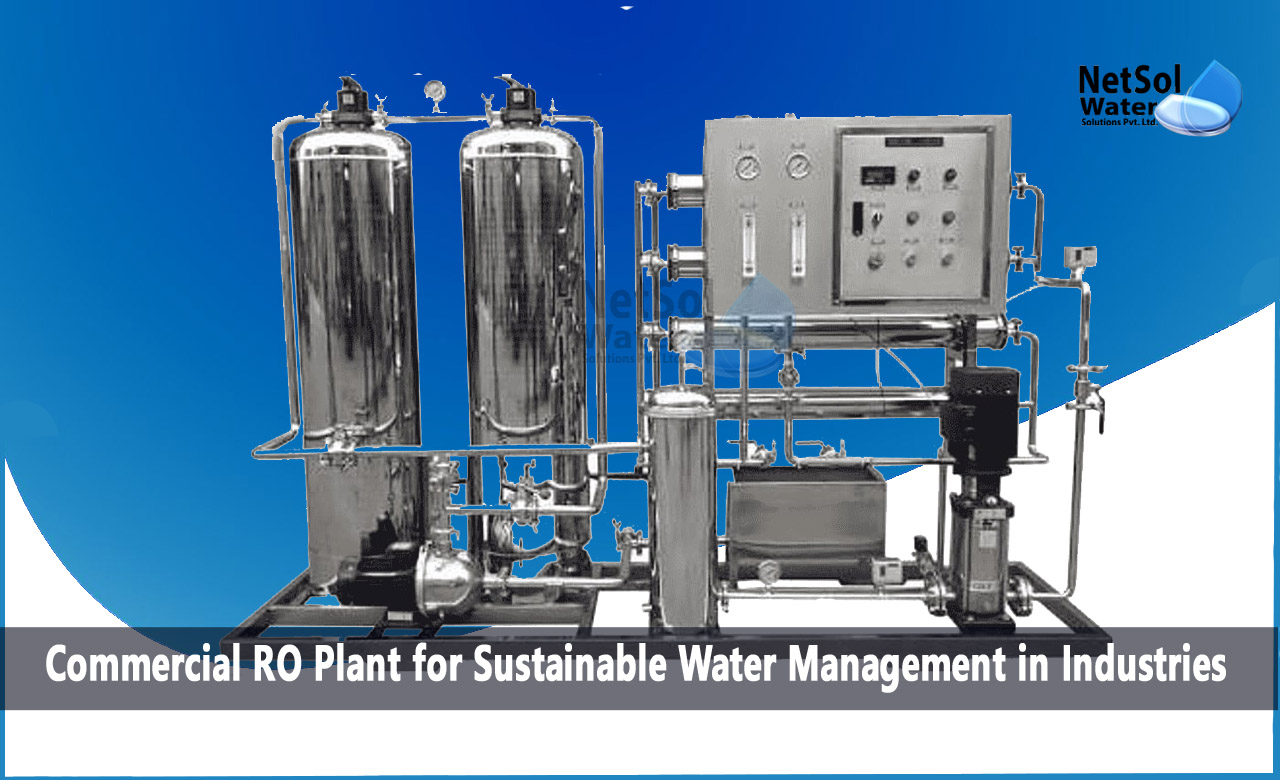Commercial RO Plant for Sustainable Water Management in Industries
Water scarcity and environmental concerns have highlighted the need for sustainable water management practices in industries. Commercial reverse osmosis (RO) plants have emerged as a key solution for achieving sustainable water management objectives. These plants play a vital role in treating and reusing water, reducing water consumption, and minimizing environmental impact.
Here we will explore the significance of commercial RO plants in promoting sustainable water management practices in industries.
Sustainable Water Management in Industries
Industries are major consumers of water for various processes, including manufacturing, cooling, cleaning, and product formulation. Sustainable water management in industries involves optimizing water usage, minimizing wastage, and implementing effective treatment and recycling systems. Commercial RO plants are essential components of sustainable water management strategies as they contribute to water conservation, reduce dependence on freshwater sources, and promote efficient water use.
Water Treatment and Reuse
Commercial RO plants are highly efficient in treating and purifying water from different sources, including wastewater. These plants remove impurities, contaminants, and dissolved solids, producing clean and reusable water. By treating and reusing wastewater, RO plants significantly reduce the demand for freshwater supplies. This not only conserves water resources but also minimizes the discharge of pollutants into the environment, promoting sustainable water practices.
Reduced Water Consumption
One of the key advantages of commercial RO plants is their ability to reduce water consumption in industries. By treating and reusing water, these plants minimize the need for continuous freshwater intake, thereby conserving valuable resources. RO-treated water can be used for non-potable purposes such as cooling towers, process water, and equipment cleaning. The implementation of RO plants allows industries to optimize water usage, leading to substantial water savings and improved sustainability.
Energy Efficiency and Environmental Impact
Commercial RO plants are designed to be energy-efficient, utilizing advanced technologies to minimize energy consumption during the water treatment process. Additionally, some RO systems incorporate energy recovery devices, which further enhance their energy efficiency. By reducing energy consumption, RO plants help mitigate the environmental impact associated with water treatment processes. The combination of sustainable water management practices and energy-efficient operations contributes to overall environmental sustainability.
Compliance with Regulatory Standards
Industries are subject to strict regulatory standards concerning water usage, discharge, and environmental impact. Commercial RO plants aid in achieving compliance with these regulations by providing reliable and high-quality water that meets the required standards. The advanced purification processes of RO plants ensure that industries can meet regulatory guidelines, maintain environmental permits, and demonstrate their commitment to sustainable water management.
Corporate Social Responsibility and Reputation
Sustainable water management practices through commercial RO plants align with corporate social responsibility (CSR) objectives. Industries that prioritize water conservation, reuse, and efficient water management enhance their reputation as environmentally responsible entities. Such initiatives not only contribute to the well-being of the environment and surrounding communities but also improve stakeholder perception, brand image, and market competitiveness.
Collaboration and Partnerships
Commercial RO plants offer opportunities for collaboration and partnerships between industries, water utilities, and regulatory bodies. Industries can collaborate with water management agencies to develop sustainable water management plans, share best practices, and implement effective water treatment and reuse systems. By working together, stakeholders can optimize water resources, promote sustainable practices, and address water scarcity challenges in a collective manner.
Summary:
Commercial reverse osmosis (RO) plants play a pivotal role in achieving sustainable water management in industries. By treating and reusing water, reducing water consumption, and minimizing environmental impact, RO plants contribute to water conservation, energy efficiency, and regulatory compliance. These plants enable industries to embrace sustainable practices, fulfill corporate social responsibility goals, and enhance their reputation as environmentally conscious entities. With their advanced technologies and versatile applications, commercial RO plants are the key to achieving sustainable water management in industries and addressing the challenges of water scarcity and environmental sustainability.
Leading manufacturer of sewage treatment plants in India.
Netsol Water is the leading manufacturer, supplier, and exporter of a quality selection of water treatment, and wastewater treatment products in India, by using advanced sewage treatment methods.
RO plants, water softeners, ETPs, STPs, DM plants, AMC, O&M, Ultra filtration, UV, Ozonation, ZLD plants, Anoxic tanks, and other goods and services are available from us. We also provide services to businesses in sectors including automotive, pharmaceutical, textile, pulp & paper, beverages, refineries, schools, hospitals, office buildings, and hotels, among others.
Netsol Water is Greater Noida-based leading water & wastewater treatment plant manufacturer. We are industry's most demanding company based on client review and work quality. We are known as best commercial RO plant manufacturers, industrial RO plant manufacturer, sewage treatment plant manufacturer, Water Softener Plant Manufacturers and effluent treatment plant manufacturers. Apart from this 24x7 customer support is our USP. Call on +91-9650608473, or write us at enquiry@netsolwater.com for any support, inquiry or product-purchase related query.



